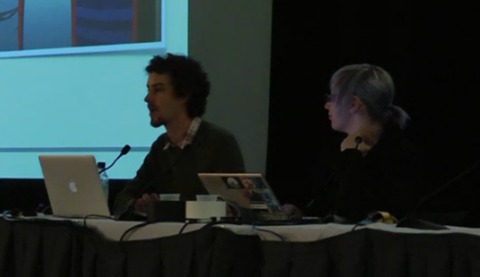Social Issues and Giant Bomb: The Internet Is Serious Business (but It Doesn't Have to Be)
By Julius 317 Comments

Behold, a picture posted somewhere by some anonymous person over a decade ago. "The Internet is Serious Business" is a meme so old that it is classified in the Know Your Meme Graveyard for Formerly Funny Jokes, and it's also a joke that wouldn't work nearly as well today. Why? Because the internet is serious business for many who partake in it these days. People invest their souls into their online personae. Users of forums, and social media develop friendships online, and they deal with real-life issues by posting online. People get so invested in the culture of the internet that arguments online don't have the majority of the participants saying "Calm down, it's the internet!" anymore, and yet that is the most salient thing anyone could say in the conversation. The internet is only serious if we let it be, and it is becoming more and more apparent that we should not.

The internet is only as powerful as we allow it to be. "I won't concede something so powerful to such a vocal minority that doesn't deserve it," says Patrick Klepek in the wrap-up of his PAX East talk on internet bullying alongside Zoe Quinn. In the talk, Klepek spoke of how we should vocalize our approval of friendly posters and also vocalize our disapproval of unkind posters, something that one could find is already happening in most comment sections. Klepek concludes that this tactic could help make online bullying "socially unacceptable," which misses the point. First, bullying people online is already socially unacceptable -- it's certainly not something you would speak of to a family member or a prospective mate or even a stranger. Also, the conversations on social topics that Patrick himself likes to talk about, and that generate a lot of bullying, are also broadly socially unacceptable. Would you chew out a stranger who said something that doesn't agree with the current state of internet-gender-politics issues? I mean, maybe you would, but the other party involved would not be very receptive, and it would be very easy to see it as socially unacceptable.

It's doubtful that actual philosophers, such as Monsieur Voltaire in all his curly-wigged glory to the right, were thinking "if only I could have to immediately defend my writings the moment I publish them from people who don't necessarily have any idea what they're talking about." The problem is that online communities aren't capable of serious discussion, because the person whose point gets heard is the person who is loudest for the longest. If people "vocalize" their feelings about the loud people, that only makes more loud people. Therefore this action only further drowns out well-reasoned conversation, which has the unfortunate property of taking a long time to think about, type out, and then have people read it.
All of this is acutely relevant to Giant Bomb at this time. Giant Bomb hired two new staff members who were both white men (and who got "heterosexual" thrown on there too, which either means people know a lot more about them than I've heard or people like making ugly assumptions to aide their cries of injustice), which caused some people in the comments to get loud about how this wasn't fair and showed that something was wrong with the site. Other people then tried to shut them up by getting even louder and involving other forums to harass them, and Jeff Gerstmann had to write up a big article about how this wasn't acceptable. Jeff targeted those who harassed the original loud people, but the question is, why was any of it acceptable? Is the comment section on a video game website the place for an in-depth discussion of hiring equality? People are banned all the time for being off-topic because it hurts the discussion of the actual topic, and this was a mighty big tangent from "Hey guys, we hired some people who were really qualified and people already liked."

Now there has been another incident where a podcast was released with socially-focused discussion on it that hadn't heard before on a Giant Bombcast, and the outrage that occurred is mostly due to the previous incident. Is Giant Bomb succumbing to criticism that they shouldn't care about? Would this have happened anyway? Does it really matter? Because people were allowed for so long to take the internet so seriously in the comments section of the last incident, now Giant Bomb is the subject of conversation that a under-10-employee company that talks about video games should never have to be. It's not socially acceptable to break into someone's place of comfort and try to disrupt it while being unkind to the people there, and that's exactly what Samantha Allen did. She had a good point, but it was already on her blog and posting it on Giant Bomb did not create useful discussion, it just opened wounds that weren't there before.
None of this would have happened if we disapproved of people who took the internet so goddamn serious. The company's image and entertainment value have been altered by third parties that were a click away from being banned and erased. Of course, it would be hard for moderators to know what was going to happen, but if they followed the rule of "ban or warn anyone who is talking about matters too serious for a video game website discussion, regardless of message" instead of "select who is being a jerk and ban or warn them," it would be extremely easy to stop anything like this from happening.
There is a post in the comments of Patrick's "Internet Jerks" video that was mentioned above that truly takes the "not taking things too seriously and trying to start fights" mentality and makes an excellent point at the same time. From @wolfgame:

Too true, Wolfgame.
If you have noticed the irony of this blog post ranting on and on, then you should know that I must have as well. So I'm going to stop now, but here's what I'm saying: the "discussion" is only hurting people. There are plenty of universities, academic publications, and other reputable venues for discussion, and the discussion is already happening there all the time. Even if you identify with one side or the other, a video game or other hobbyist community doesn't need to be the place for serious discussion.
Can we just go back to funny pictures and video games?
